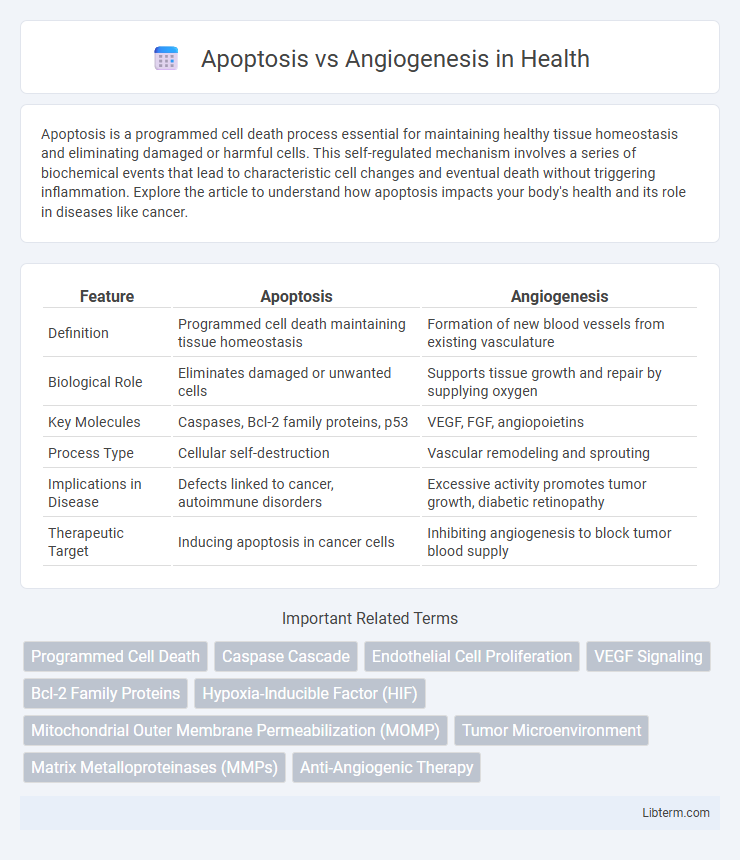Apoptosis is a programmed cell death process essential for maintaining healthy tissue homeostasis and eliminating damaged or harmful cells. This self-regulated mechanism involves a series of biochemical events that lead to characteristic cell changes and eventual death without triggering inflammation. Explore the article to understand how apoptosis impacts your body's health and its role in diseases like cancer.
Table of Comparison
| Feature | Apoptosis | Angiogenesis |
|---|---|---|
| Definition | Programmed cell death maintaining tissue homeostasis | Formation of new blood vessels from existing vasculature |
| Biological Role | Eliminates damaged or unwanted cells | Supports tissue growth and repair by supplying oxygen |
| Key Molecules | Caspases, Bcl-2 family proteins, p53 | VEGF, FGF, angiopoietins |
| Process Type | Cellular self-destruction | Vascular remodeling and sprouting |
| Implications in Disease | Defects linked to cancer, autoimmune disorders | Excessive activity promotes tumor growth, diabetic retinopathy |
| Therapeutic Target | Inducing apoptosis in cancer cells | Inhibiting angiogenesis to block tumor blood supply |
Introduction to Apoptosis and Angiogenesis
Apoptosis is a programmed cell death process essential for maintaining cellular homeostasis and eliminating damaged or harmful cells without triggering inflammation. Angiogenesis involves the formation of new blood vessels from existing vasculature, crucial for tissue growth, wound healing, and tumor progression. Both apoptosis and angiogenesis play critical roles in development and disease, often exhibiting interconnected regulatory mechanisms.
Defining Apoptosis: Programmed Cell Death
Apoptosis is a tightly regulated process of programmed cell death essential for maintaining cellular homeostasis and eliminating damaged or unwanted cells. This mechanism involves a cascade of molecular signals that trigger cell shrinkage, DNA fragmentation, and membrane blebbing without inducing inflammation. Unlike angiogenesis, which promotes new blood vessel formation, apoptosis serves as a crucial counterbalance by preventing uncontrolled cell proliferation and tumor development.
Understanding Angiogenesis: Formation of New Blood Vessels
Angiogenesis is the physiological process through which new blood vessels form from pre-existing vessels, crucial for tissue growth and repair. This process involves endothelial cell activation, proliferation, migration, and differentiation, regulated by signaling molecules like vascular endothelial growth factor (VEGF) and fibroblast growth factor (FGF). Understanding angiogenesis is essential for developing therapies targeting cancer, diabetic retinopathy, and cardiovascular diseases by controlling abnormal vessel formation.
Molecular Mechanisms of Apoptosis
Apoptosis is a programmed cell death process regulated by intrinsic and extrinsic molecular pathways involving key proteins such as caspases, Bcl-2 family members, and mitochondrial cytochrome c release. The intrinsic pathway triggers apoptosis through mitochondrial outer membrane permeabilization, leading to activation of caspase-9 and the executioner caspases, while the extrinsic pathway involves death receptors like Fas and TNF receptors activating caspase-8. In contrast, angiogenesis promotes new blood vessel formation primarily through VEGF signaling, which supports cell survival and proliferation, opposing apoptotic mechanisms and facilitating tissue growth and repair.
Key Regulators of Angiogenesis
Key regulators of angiogenesis include vascular endothelial growth factor (VEGF), fibroblast growth factors (FGFs), and angiopoietins, which promote the formation of new blood vessels from existing vasculature. Hypoxia-inducible factors (HIFs) activate VEGF expression under low oxygen conditions, driving endothelial cell proliferation and migration. In contrast to apoptosis that involves programmed cell death regulated by caspases and Bcl-2 family proteins, angiogenesis involves complex signaling pathways to maintain tissue oxygenation and support tumor growth.
Apoptosis vs Angiogenesis: Biological Roles and Differences
Apoptosis is a programmed cell death process essential for maintaining tissue homeostasis, while angiogenesis involves the formation of new blood vessels from existing vasculature, crucial for wound healing and tumor growth. Apoptosis eliminates damaged or unnecessary cells, preventing abnormal cell proliferation, whereas angiogenesis promotes oxygen and nutrient delivery to tissues, supporting cellular survival and growth. The balance between apoptosis and angiogenesis is vital in physiological processes and pathological conditions such as cancer, where deregulated apoptosis and enhanced angiogenesis contribute to tumor progression.
Interplay Between Apoptosis and Angiogenesis in Disease
The interplay between apoptosis and angiogenesis critically influences disease progression, particularly in cancer and chronic inflammatory conditions. Dysregulated apoptosis can lead to abnormal endothelial cell survival, promoting excessive angiogenesis that supports tumor growth and metastasis. Therapeutic strategies targeting this balance aim to restore controlled cell death while inhibiting pathological blood vessel formation to halt disease advancement.
Apoptosis and Angiogenesis in Cancer Development
Apoptosis regulates cell death to eliminate damaged or abnormal cells, preventing tumor formation by maintaining tissue homeostasis. In contrast, angiogenesis facilitates cancer progression by promoting new blood vessel growth, which supplies tumors with oxygen and nutrients for rapid expansion. The imbalance between inhibited apoptosis and enhanced angiogenesis is a critical driver of cancer development and metastasis.
Therapeutic Strategies Targeting Apoptosis and Angiogenesis
Therapeutic strategies targeting apoptosis focus on inducing programmed cell death in cancer cells by modulating pro-apoptotic proteins such as Bax and anti-apoptotic proteins like Bcl-2, utilizing agents like BH3 mimetics and TRAIL receptor agonists. In contrast, angiogenesis-targeted therapies aim to inhibit new blood vessel formation essential for tumor growth by blocking vascular endothelial growth factor (VEGF) signaling pathways with drugs like bevacizumab and tyrosine kinase inhibitors. Combining apoptosis induction with angiogenesis inhibition enhances anti-cancer efficacy by simultaneously promoting tumor cell death and starving tumors of nutrients and oxygen.
Future Perspectives in Apoptosis and Angiogenesis Research
Emerging research in apoptosis and angiogenesis focuses on elucidating molecular pathways to develop targeted therapies for cancer and cardiovascular diseases. Advancements in gene editing technologies like CRISPR-Cas9 offer promising avenues to manipulate apoptotic and angiogenic signaling for precision medicine. Integration of multi-omics and artificial intelligence is accelerating the identification of novel biomarkers and therapeutic targets to enhance treatment efficacy and reduce adverse effects.
Apoptosis Infographic

 libterm.com
libterm.com